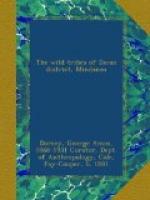Peace can be effected by means of a blood compact known as dayandi. Each principal cuts his own wrist until the blood flows freely; this he catches in his free hand and offers to the other participant to drink. Sometimes the blood of both is caught and mixed in a dish from which they drink, meanwhile addressing the tigyama,[1] saying, “We are now like brothers, like children of the same parents, and now we cannot fight any more. We ask you to be the witnesses.”
[l] See p. 107. [Transcriber’s note: 12 pages later in this document.]
SOCIAL ORGANIZATION.
There seems to be no trace of clan or totemic grouping among the Bagobo. Blood relationship is traced as far as the second cousin and is a bar to marriage. The suggestion that a man might marry his mother-in-law was received with horror, but whether this was due to local mother-in-law stories or to an idea of relationship could not be ascertained. However, a man may marry the sister of his wife.
Each district has its head man, or petty datu who is supposed to be subject to the datu of Cibolan. This seems actually to have been the case until a few years ago, when some of the local rulers withdrew their allegiance. The office is hereditary and usually passes from the father to his eldest son. Should the datu be without an heir, or the son be considered inefficient, the under chiefs and wise old men may choose a leader from among their number.
In his own district the power of the datu is very great, but even he is obliged to respect the laws and customs handed down by the ancestors. He is supreme judge in all matters, though he may, if he desires, call in the old men to help him decide difficult cases. The usual method of punishment is by means of a fine. Should the culprit be unwilling or unable to pay he is placed in servitude until such a time as the debt is considered canceled, but should he refuse to serve he is killed without further ado. The datu appoints a man for this purpose, and he usually gets his victim by stealth, either by waylaying him in the road or by driving a spear through him as he lies asleep on the floor of his house. When a fine is levied the datu retains a portion as pay for his services; if the more drastic punishment follows it serves to emphasize his power and is more valuable to him than the payment. When his house needs repairing, his hemp requires stripping, or his fields need attention, his followers give him assistance. In return for these services he helps support a number of fighting men who can always be called upon for the defence of the people. His house is considered the property of all to the extent that anyone goes there at any time and stays as long as he pleases, partaking meanwhile of the datu’s food. In times of danger, or during festivals, all the people assemble there and assist, in the defense or the merry-making.




